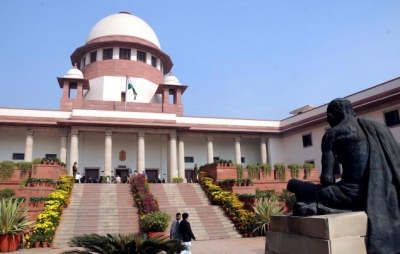New Delhi, Aug 16 : The Centre has told the Supreme Court on Tuesday that there is no merit in an argument that claims to have seen an increase in violence against Christians in India.The government claimed that these deceitful petitions are causing a lot of tension in the country, may be trying to obtain assistance from outside to interfere with the internal matters of the country.
In an open letter to a written response, the Ministry of Home Affairs said: “It is submitted that there may be a hidden motive in filing these deceitful petitions, causing unrest throughout the country, and possibly for getting help from outside to interfere with the internal matters of the nation.”
The ministry claimed that the petitioner has turned to self-serving and false documents and also quoted press reports, in which Christian persecution is untrue or inaccurately propagated.
The MHA stated: “It is submitted that upon a preliminary assessment of the truthfulness of the assertions made in the petition based on the results of the inputs that were received, it is concluded that the petitioner resorted to lying and has also used some specific self-serving papers.The affidavit sought to expose the inputs received before the court.”
The ministry stated that incidents of minor conflicts, in which there was no religious or community angle were also reported in self-serving news reports as incidents of violent acts against Christians.
The petitioner, based on such self-serving reports and articles is requesting that the Apex court conducts a fishing inquiry in every country, without not even bothering to notify the court that none of the facts have been confirmed by the petitioner or by the so-called organizations who prepared the reports.
The government stated that in certain instances incidents of pure criminal nature and that arise out of personal issues were classified as acts of violence aimed at Christians.
“It is believed that a review of self-serving and half-baked facts as well as self-serving news articles and reports which culminate in an application made up of merely conjectures clearly suggests an obscure motive,” added the MHA.
The ministry said it is a recent trend that some organizations have begun creating self-serving reports on their own or through their associates which later form the basis of an petition for writ or PIL.
“This is a risky trend that negates the purpose of why PIL jurisdiction was created by this court” MHA said in its response.MHA declared in its reply.
The government claimed that the petitioners claimed to have built the petition on information collected from sources such as press releases, “independent” online databases and the findings of various non-profit organizations.
“The individual incidents cited by the petitioner in putting an emphasis on the reporting of news outlets also demonstrates the deliberate distortion of facts about the events that took place in the incidents mentioned,” said the MHA.
The MHA stated in its reference to the annexe titled Christians being targeted in India – the fact-finding report’, which was prepared by the Association for Protection of Civil Rights (APCR) as well as the UCF and United Against Hate (UAH) A preliminary check of the facts and the inputs they received shows that the majority of the claims and assertions included in the report were discovered to be unsubstantiated and that the vast majority of the stories mentioned were either exaggerated or false or unsubstantiated.
“The incidents, which are quoted here from the UCF, PR and EFI/RLC’s reports were based on claims of calls to their helpline and social media websites and the organizations are not able to verify the incidents that they reported via their helpline or sites,” the government said.
The MHA stated that a preliminary check of the facts of the incidents mentioned and the inputs that were received revealed that in the report, 162 incidents were not accurately recorded and the rest 139 were either fake or intentionally portrayed to be instances of specific violence directed at Christians.
The MHA’s response was based upon an appeal claiming a rise in the numbers of assaults on Christian churches and priests across the nation and demanded the application of the guidelines it has issued to reduce hate crimes.The petitioners — Rev.Peter Machado and others -demanded the implementation of guidelines that were issued by the apex court in the 2017 Tehseen Poonawala verdict.
Solicitor General Tushar Mehta submitted before a bench headed by Justice D.Y.Chandrachud that MHA has submitted its reply in the case.
Senior counsel Colin Gonsalves, representing the petitioners, requested time to make a rejoinder.The highest court has set the matter for a second hearing on the 25th of August.
ss/arm







